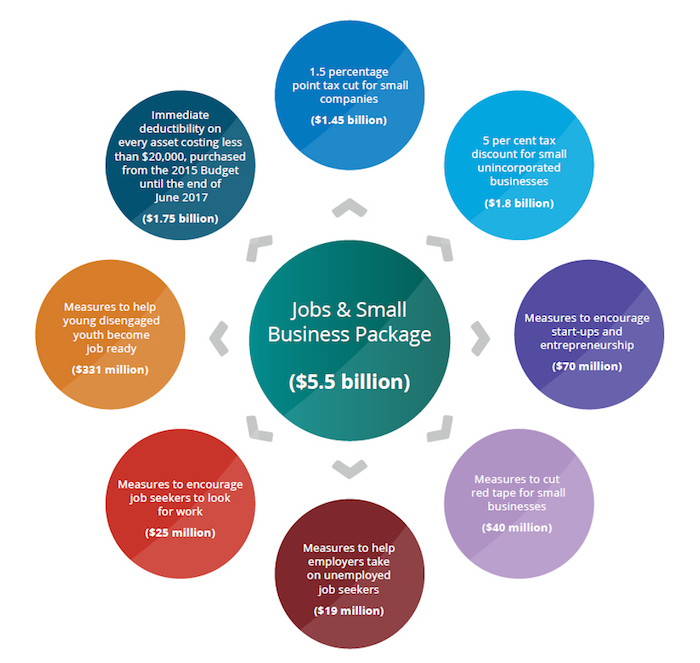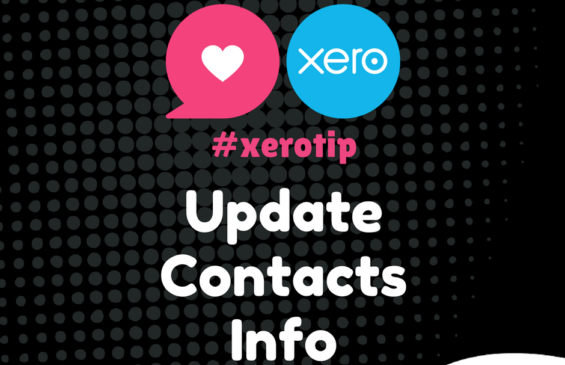What are the *wins* for Small Business
The only immediate win for small business is the instant write off of assets costing less than $20,000. Now it's important to understand this is not an extra deduction, rather the bringing forward of your depreciation deduction. From 7.30pm last night (12th May) any asset you purchase that costs less than $20,000 can be claimed as a tax deduction in the year of purchase. Normally you would need to claim assets costing more than $1,000 over a number of years. For those of you needing to upgrade equipment this is a brilliant result. But as usual any asset purchases need to be planned from a cashflow perspective.
The next win is a cut to the Company Tax Rate from 30% to 28.5%. This starts on the 1st July 2015 and means that you will pay $15 less tax for every $1,000 profit. So if your Company Profit is $50,000 for the year you will pay $750 less in tax. Note this only applies if your business is structured as a Company and your turnover is less than $2 million.
For those business who are not setup as Companies all is not lost. From 1st July 2015 a 5% tax discount will be applied to the tax payable on business income for Individuals capped at $1,000 per Individual. This measure still only applies if the business turnover is less than $2 million. So if you are setup as a Trust and the business income distributed to you for the year is $75,000 you will currently pay $16,000 in tax. With the 5% discount you would only pay $15,200 in tax - ie a saving of $800.
With the cut to Company Tax Rates there is also a measure in place to ensure CGT Rollover Relief for those who may want to change the business entity they operate in. I.e move from a Sole Trader to a Company or Trust. That means you pay no tax now if you want to change your business structure. This only applies from the 1st July 2016.
Another win for anyone setting up a business is the ability to write off immediately the professional costs of setting up a business. At the moment the Company Setup Fees you pay to ASIC and the advice from Accountants/Lawyers etc is not immediately deductable, rather claimed over 5 years. This applies from 1st July 2015.
All work-related portable electronic devices used by employees will be exempt from Fringe Benefits Tax. Previously if you provided a Laptop + Mobile Phone to employees you would be liable for FBT on one of the devices. This exemption will apply from 1 April 2016 and apply to businesses with a turnover less than $2 million
There are also changes to the meal entertainment rules. A new cap of $5,000 applies for salary sacrificed meal entertainment. This generally only applies to Not-For-Profits.
Significant changes are also being made to the Employee Share Schemes from the1st July 2015. At the moment if you offer your employees shares they pay tax when they receive those shares. Now the tax will be deferred until the shares are realised.
While crowdsourced equity funding has been a hot topic of late we will need to wait possibly until the end of the 2016 financial year for any real detail. ASIC have been given a pile of money to reduce the red tape around this area - ie access to money without the costs of setting up as a public company.
A $1.2 billion dollar national wage subsidy pool has also been established. This is to encourage employers to hire young people and mature age workers. We will cover these great measures in a separate post for you.
What are the changes for Pensioners
There are no new changes to Superannuation this year. The big change is the eligibility tests for the Aged Pension. To qualify for a part pension your assets outside the family home will need to be less than $823,000 for couples and $547,000 for single retirees. These thresholds are dropping from $1.15million for couples and $775,000 for singles. These thresholds apply for home owners only.
What are the changes for Individual Taxpayers
For Employees the budget didn't look to change too much. Personal Tax Rates remain unchanged with a slight increase in the medicare levy low income threshold only.
If you claim Motor Vehicle Expenses in your personal Income Tax Return from the 1st July 2015 you will only have 2 options - cents/km and log book methods. The cents/km method will be capped at 66cents/km no matter what your engine size.
Changes have been made to the Zone Tax Offset to eliminate workers who are on fly-in, fly-out contractors being able to access the offset. This applies from the 1st July 2015.
Holiday workers (non-residents) will no longer have access to the Tax Free Threshold. They will instead pay tax at 32.5% for every dollar earned up to $80,0000. This applies from 1st July 2016
HELP debts are under the microscope. For Australians who are living overseas for more than 6 months, they will need to register with the ATO and start to repay their debts based on worldwide income. This commences from the 2016-2017 year.
As usual on Budget night the Growthwise team spent the night updating the main benefits to small business on our Facebook Page and wading through all of the Budget Papers. We will continue to post commentary and updates re the budget so don't forget to check back for updates or post any questions you have re the budget.
A nice little summary Infographic of the winners and losers if you prefer pictures :)
Action Items/What Next
While this is a general overview of the changes our next step at Growthwise is to embark on your personal tax planning - what you need to do before 30th June to pay less tax. To make the most out of these new budget measures expect your personal checklist of action items over the coming weeks.




